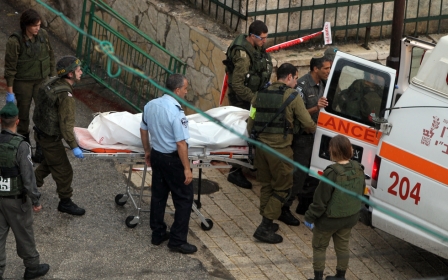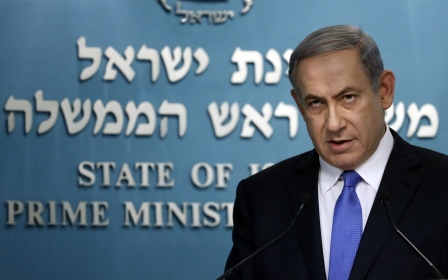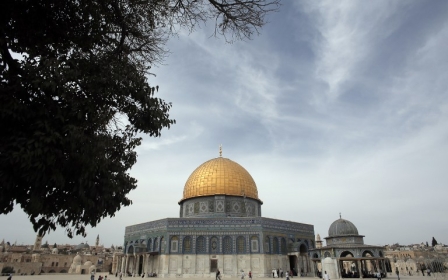Israel accused of blocking camera installation at Jerusalem holy site

The Jordanian body that oversees the al-Aqsa Mosque compound accused Israeli police on Monday of blocking the installation of cameras at the holy site, a key measure brokered by US Secretary of State John Kerry over the weekend to defuse Israeli-Palestinian tensions.
The Jerusalem Islamic Waqf said a team was "working on the installation of cameras belonging to the Islamic Waqf...but the Israeli police interfered directly and stopped the work".
"We severely condemn the Israeli interference into the working affairs of the Waqf, and we consider the matter evidence that Israel wants to install cameras that only serve its own interests, not cameras that show truth and justice," it said in a statement.
Israeli police had no immediate comment.
Prime Minister Benjamin Netanyahu’s office, however, denied the allegations late Monday and said the cameras would be installed “according to the results of arrangements to be determined between the parties,” said a statement quoted in Israeli media.
"Israel has already expressed its consent to start the process as soon as possible,” the statement said.
Clashes – thought to have fuelled the past three weeks of Israeli-Palestinian violence - broke out at the site in September between Israeli police and Palestinians who accuse Israel of seeking to change the rules governing the compound to allow Jews to pray there, which is currently not allowed.
With Palestinians accusing Israel of trying to seize administrative control of the site, and Israel claiming that the location which Jews call Temple Mount is being used by Palestinian youth to stage unruly protests, the installation of cameras was proposed as a means of verifying conflicting allegations.
After talks on Saturday with Jordan's King Abdullah II, Kerry said that security cameras would be a "game changer in discouraging anybody from disturbing the sanctity of the holy site".
Jordan's Foreign Minister Nasser Judeh also said the cameras would “indeed make a difference and a very strong difference at that".
Crucible of tensions
The location has long been a crucible of tensions in the Israeli-Palestinian conflict.
Situated in East Jerusalem, the site is known to Muslims, who consider it the third holiest site in Islam, as the al-Aqsa Mosque compound and to Jews, who revere it as their holiest site, as Temple Mount.
Annexed from Jordan in 1967, Amman has retained custodial rights over the daily affairs of the site, administered by the Jordanian Waqf, while Israel controls access.
A 1967 decree issued by Israeli's chief rabbi forbade Jews from visiting the compound.
Israel, however, has frequently been accused by Palestinians of attempting to alter past agreements on the site.
Israel controls all of Al-Aqsa’s entry points, where it usually stations armed security forces, often banning entry to Palestinian men under 50.
According to Emek Shaveh, an Israeli group that studies archaelogical sites in Jerusalem, the number of days during which Israel imposed age restriction bans on entry to Aqsa increased from three days in 2012 to 41 in 2014.
On Sunday, Netanyahu vowed that Jews would continue to be allowed to visit, but not pray at the compound and agreed that 24-hour surveillance cameras could be installed.
"Israel has an interest in placing cameras on all parts of the Temple Mount," he said in a statement.
"Firstly, to refute the claim Israel is violating the status quo. Secondly, to show where the provocations are really coming from, and prevent them in advance."
New MEE newsletter: Jerusalem Dispatch
Sign up to get the latest insights and analysis on Israel-Palestine, alongside Turkey Unpacked and other MEE newsletters
Middle East Eye delivers independent and unrivalled coverage and analysis of the Middle East, North Africa and beyond. To learn more about republishing this content and the associated fees, please fill out this form. More about MEE can be found here.




